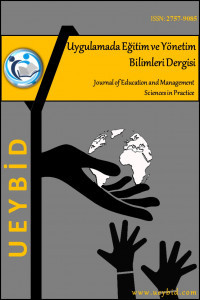PANDEMİ SÜRECİNDE KIRSALDA GÖREV YAPAN 1.SINIF ÖĞRETMENLERİNİN KARMA EĞİTİM MODELİ HAKKINDAKİ GÖRÜŞLERİ
Milli Eğitim Bakanlığının aldığı kararla 2020-2021 eğitim-öğretim yılının karma eğitim modeliyle tamamlanması uygun görülmüştür. Bu bağlamda kırsaldaki 1.sınıflar Eylül ayında iki gün yüz yüze diğer üç gün ise uzaktan eğitime devam etmiştir. Çalışmanın amacı kırsalda görev yapan 1.sınıf öğretmenlerinin bu 2020-2021 eğitim öğretim yılında uygulanan karma eğitim modeli sürecinde yaşadıkları zorlukları belirlemek ve bu zorluklara karşı olası çözüm önerileri ortaya koyabilmektir. Bu araştırma nitel bir araştırma olup özel durum yöntemiyle yürütülmüştür. Araştırma grubu amaçlı örnekleme yöntemi kullanılarak belirlenmiştir. Çalışma grubunu Türkiye’nin farklı illerinde 2020-2021 eğitim-öğretim yılında kırsalda görev yapan 10 birinci sınıf öğretmeni oluşturmuştur. Araştırma verileri yapı-yapılandırılmış görüşme ile toplanmıştır. Görüşme verileri betimsel analiz kullanılarak incelenmiştir. Yapılan analizler sonucunda sınıf öğretmenlerinin karma eğitim modelinin öğrenci ve öğretmenler için verimsiz olduğuna vurgu yaptıkları görülmüştür. Kırsalda yaşayan öğrencilerin büyük kısmının uzaktan eğitime erişmede sıkıntı yaşadığı, ebeveynlerin gerekli desteği sağlayamadığı, 1.sınıf öğrencilerini takip etmede çok sıkıntı yaşandığı ve tespit edilmiştir.
THE OPINIONS OF THE 1st GRADE TEACHERS WORKING IN RURAL DURING THE PANDEMIC PROCESS ON THE COMBINED EDUCATION MODEL
With the decision taken by the Ministry of National Education, it was deemed appropriate to complete the 2020-2021 academic year with a co-educational model. In this context, first graders in rural areas continued face-to-face education for two days and distance education for the other three days in September. The aim of the study is to determine the difficulties experienced by first grade teachers working in rural areas during the co-education model applied in this 2020-2021 academic year and to suggest possible solutions to these difficulties. This research is a qualitative research and was carried out with the special case method. The research group was determined using purposive sampling method. The study group consisted of 10 first grade teachers working in rural areas in different provinces of Turkey in the 2020-2021 academic year. Research data were collected by structure-structured interview. Interview data were analyzed using descriptive analysis. As a result of the analysis, it was seen that the classroom teachers emphasized that the mixed education model was inefficient for students and teachers. It has been determined that most of the students living in rural areas have difficulties in accessing distance education, that their parents cannot provide the necessary support, and that there is a lot of difficulty in following the 1st grade students.
___
- REFERANS1: TANER ALTUN
REFERANS2: GAMZEGÜL ENGİN
REFERANS3: EYUDER
